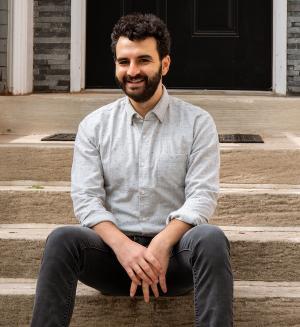
Yale University, PhD' 18
BIOGRAPHY
Gabriel Winant is a historian of labor, political economy, capitalism, and the welfare state. The core of his research program is to interrogate changing forms of social class in modern societies. He studies how economic production shapes the composition of classes and the formation of state institutions; and how this shaping is mediated by the articulations of race, gender, sexuality, and disability.
His first book, The Next Shift: The Fall of Industry and the Rise of Health Care in Rust Belt America, used the transformation of the Pittsburgh in the twentieth century as a case study. The Next Shift followed the restructuring of the labor market, from steel to health care, showing how deindustrialization simultaneously destroyed the industrial working class and summoned a new working class in the service economy. The Next Shift won the Frederick Jackson Turner Prize for the best first book in U.S. history from the Organization of American Historians, the C.L.R. James Award from the Working-Class Studies Association, and the Isaac and Tamara Deutscher Memorial Prize for the best new writing in the Marxist tradition. It also received honorable mention for the David Montgomery Award for the best book in labor and working-class history, and was a finalist for the Hagley Prize for best book in business history.
He is currently working on two projects. One, tentatively titled Class Conscious, will be a history of class in America, under contract with Penguin. This book will show the slipperiness of ideas about class, how they transform in a loose way in relation to changes in the structure of production, even as stylized images endure across generations. The second, tentatively titled Our Weary Years: The Politics of Unemployment and the Making of New Deal Liberalism, will retell the story of the origins of the labor movement and the welfare state in the interwar period, arguing for the importance of uneven economic development in the American economy, the centrality of problems of informality and seasonality in labor markets, and the consequences these phenomena had for the possibilities of working-class formation.
Recent Research / Recent Publications
- “State Agency: Social History with and beyond Institutionalism.” In Mastery and Drift: Professional-Class Liberals since the 1960s, edited by Brent Cebul and Lily Geismer, 277-296. University of Chicago Press, 2025.
- “The Baby and the Bathwater: Class Analysis and Class Formation after Deindustrialisation." Historical Materialism 32, no. 2 (2024): 3-30.
- “The Fissured Welfare State: Care Work, Democracy, and Public-Private Governance.” In The Cambridge Handbook of Labor and Democracy: Constructing, Deepening, and Defending Citizenship Rights, edited by Angela B. Cornell and Mark Barenberg, 334-350. Cambridge University Press, 2022.
- The Next Shift: The Fall of Industry and the Rise of Health Care in Rust Belt America. Harvard University Press, 2021. Winner of the 2022 Frederick Jackson Turner Award.
- "The Natural Profits of Their Years of Labor: Mass Production, Family, and the Politics of Old Age," forthcoming in Radical History Review 139 (January 2021).
- “Anomalies and Continuities: Positivism and Historicism on Inequality,” Journal of the Gilded Age and Progressive Era 19, no. 2 (April 2020), 285-295.
- “‘Hard Times Make for Hard Arteries and Hard Livers’: Deindustrialization, Biopolitics, and the Making of a New Working Class,” Journal of Social History 53, no. 1 (Fall 2019), 107-132.
- “Inner Dialogue,” History Workshop Journal 87 (Spring 2019), 301-310.
- “A Place to Die: Nursing Home Abuse and the Political Economy of the 1970s,” Journal of American History 105, no. 1 (June 2018), 96–120.
- “The Making of Nickel and Dimed: Barbara Ehrenreich and the Exposé of Class in America,” Labor 15, no. 1 (Feb. 2018), 67–79.
- “Conflict and Consensus: The Steel Strike of 1959 and the Anatomy of the New Deal Order,” coauthored with Kristoffer Smemo and Samir Sonti, Critical Historical Studies 4, no. 1 (Spring 2017), 39–73.
- “‘Green Pastures of Plenty from Dry Desert Ground’: Nature, Labor, and the Growth and Structure of a California Grape Company,” Enterprise and Society 16, no. 1 (Mar. 2015), 109–40.
- “State Agency: Social History with and beyond Institutionalism.” Under review for Brent Cebul, Lily Geismer, and Mason Williams, eds., New Histories of Liberalism, forthcoming.
- “The Fissured Welfare State: Care Work, Democracy, and Public-Private Governance.” In Labor and Democracy: Constructing, Deepening, and Defending Citizenship Rights, edited by Angela B. Cornell and Mark Barenberg, 334-350. New York: Cambridge University Press, 2022.
- Writes book review for Dissent Magazine, Summer 2019
 THE UNIVERSITY OF CHICAGO
THE UNIVERSITY OF CHICAGO

